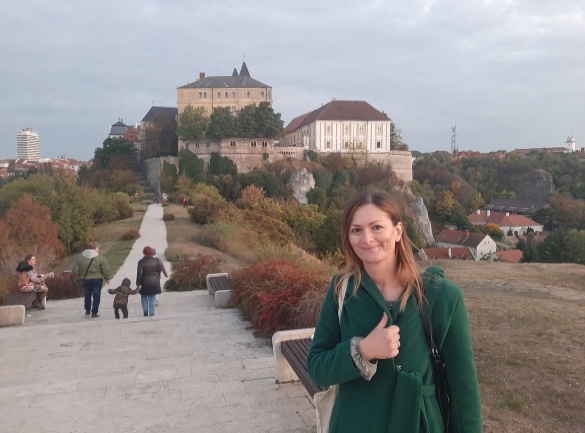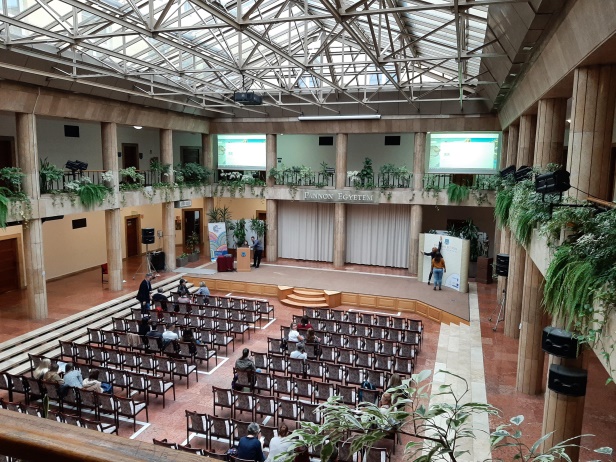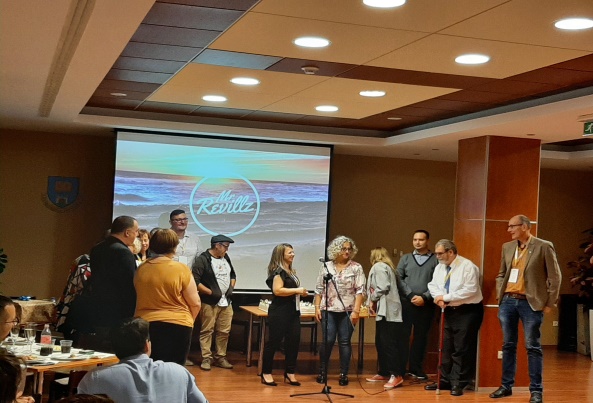- Home
- Various Articles - Some projects and conferences
- Hip Hop Hooray – IATEFL 30+1 Birthday Conference
Hip Hop Hooray – IATEFL 30+1 Birthday Conference
Tamara Bradonjic was born in 1981 in Kragujevac. She graduated in English language and literature from the Faculty of Philology in Belgrade in 2005. Besides education as a teacher, she is also educated as a translator in the Association of Scientific and Technical Translators of Serbia. She has been teaching for 16 years in a primary school “Milan Blagojevic” in Natalinci. In her work she combines various techniques, such as teaching with music and teaching with graphic novels. Translation is her hobby, especially translating legal and economic documents for university professors. Teaching is learning, and teaching children should motivate us to be learners at the same time. Her other hobbies are listening to music, cooking, reading books and writing poetry.

Note
NoteConference held on 8th -9th October in Veszprem, Hungary
Tamara Bradonjic was ELTA Serbia representative
It has been such a great honor for me to be ELTA Serbia representative at this amazing event that finally took place in live circumstances. The conference was held at the gorgeous University of Pannonia in the splendid city of Veszprem in Hungary. My feeling was like being in the museum of English language artists and craftsmen. Here in this photo, you can see the main hall of the university where the plenary speakers presented their sessions.

IATEFL organizers did a great job regarding the venue and the choice of workshops. There were 5 plenary speakers, 48 workshops (16 online), 32 live and hybrid sessions. There were participants and representatives from various countries and parts of the world. Everybody was looking forward to being at a live conference after such a long time. It is very difficult for me to choose what to describe in my report and put two days in one piece of paper. However, I made a choice and I’ll describe the sessions that made the greatest impact on me.
The opening plenary was delivered by Judit Navracsics who was speaking about monolingualism and multilingualism – 30 years down the road from a monolingual to a multilingual world. Thirty years ago monolingualism was the norm in the European and North-American contexts, thus most people belonged to one nation speaking one language and belonging to one culture. Various factors, such as European integration, migrations and revitalizations of less used languages, influenced changes not only in linguistics and languages, but in people’s consciousness. According to the study results’ teachers of both first and second languages need to embrace the development of new ideas and approaches in order to help learners’ become multilingual.
The second plenary was great Uwe Pohl whose session was magic just like the title Teacher Development? It’s a kind of magic! He was speaking about what teacher development means and how English teachers have become better at what they do, as well as in which amount it’s personally and professionally intriguing. There are numerous models that describe teacher’s development as a process that gradually and systematically develops over time. Experience is necessary to become an expert. According to other models, teachers go through predictable stages from novice to expert, so their development is a sequence of professional life cycles. Again some models consider teachers progressing from “new” to “knowledgeable” practitioners. All the definitions are considerable and fundamental for visualizing the cognitive, social and professional complexity of teacher learning. However, there is more to tell and more to discover, so the speaker tried so signalize on the personal experience of what he sees as contributing to teacher development (formative experiences, transformational moments and unforeseen challenges)
The opening plenary on the second day was the one delivered by Jasmina Sazdovska, entitled Meeting tomorrow’s communicative needs with yesterday’s resources. The speaker was talking about the celebration of IATEFL-Hungary’s 30th birthday from the perspective of today remembering how it was in the past 30 years. Thanks to the previous knowledge and inheritance, today we have various tools and ideas that will further contribute to the future challenges of English teaching. IATEFL- Hungary has provided means to successfully meet communicative needs of tomorrow. This birthday conference has proven it being both live and hybrid.
The birthday party itself was marvelous and I was overwhelmed to be at a real international party. Everybody was dancing both young and older ones so the atmosphere was truly amazing. What I liked most is the naturalness of the moment, the time and the place. Oh, my Gosh…a lifelong memory!

Workshops and talks were so various and interesting. It’s a pity they were parallel, so it was impossible to visit them at the same time. The most inspiring one was the workshop delivered by the great colleague Sandra Vida from Slovenia IATEFL, entitled A very serious talk about what matters and what not. Just like the title says, it was a very serious and sincere talk about how we can and should learn from our past experiences and from our mistakes. Sandra was telling us about her not successful classes and trainings and what she has learned out of it. It was so effective and emotional that the final applause showed the effect she has made on us. Everyone should be aware of the fact that teaching is a lonely job and being ready to learn from mistakes proves that change is the only constant thing.
The workshop delivered by Kolos Esztergályos has also made a great impact on me, entitled The flipped classroom – why it is a good idea and how to start it. The speaker tried to emphasize the flipped learning model, stressing the independent study which is used prior to group study time. Therefore the traditional model of a classroom is “flipped” because students first receive input and then complete tasks. Benefits are changing student/teacher roles, giving students agency and making them responsible for their own learning, allowing them enough time on internalizing the input and improving self-esteem. There are challenges as well such as time-consumption, unprepared learners, insufficient control in classes and parental control. However, good suggestions are to first start with small groups, have lots of trials and changes, arrange classrooms and be confident in the platforms that worked out (that teachers or students want to use).
My colleague from Hupe Anita Žepina delivered a very interesting workshop From Doodles to Letters, demonstrating the young learners’ process of development from the first to fourth grade. With very young learners (1st and 2nd gardeners) it is important to plan ahead and have a lot of meaningful activities, to visualize writing with flashcards, picture cards and games, to combine skills but above everything it’s important to be patient. As they grow up, their cognitive abilities also grow and gradually writing is introduced with 3rd graders. It’s important to start with draw/ write and true/false activities so that as 4th graders they could write short texts up to forty words.
I would like to finish off my report with the message of the last plenary of IATEFL-Hungary 30+1 Birthday Conference. Closing plenary, Things I wish I’d known at the time: life lessons in English teaching, was delivered by Zoltán Rézműves. One of the questions for the audience was to think of the moment when we decided to become English teachers and to talk with a person sitting next to us. At that moment I felt like being on a merry-go-round, going back to the grade 5 and my first English class at school. It was love at first hearing, so many thanks to the most wonderful English teacher in the world. At that moment I just knew English language would be my future. From then onwards I have been on the longest lifelong journey, the journey that truly makes sense to my life. I have learned the valuable life lessons so far and yet there is much more to be learned in the years to come.
Pilgrims Training Course in Oradea, Romania
Nada Filipovic, Serbia;Milica Vojvodic, SerbiaThe English Access Microscholarship Program, On behalf of the ELTA Board: Jelena Jevtovic
“The Danube Story”: Drama as a Tool to Teach Cultural Heritage in a Second Language Class
Olja Milosevic, SerbiaThe European Day of Languages 2021
Svetlana Gavrilovic, SerbiaHip Hop Hooray – IATEFL 30+1 Birthday Conference
Tamara Bradonjic, Serbia